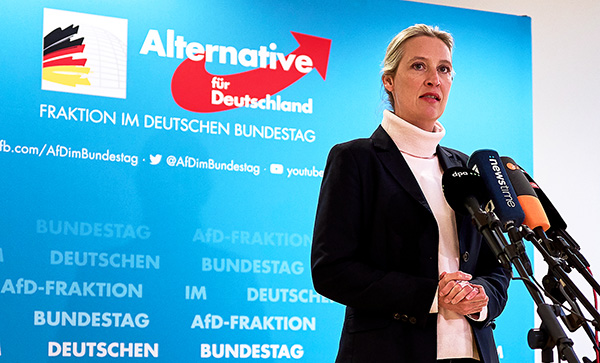
◄►◄❌►▲ ▼▲▼ • BNext New CommentNext New ReplyRead More
More people, fewer Germans, less agency and no growth is the toxic cocktail that J D Vance has laid bare.
U.S. Vice President JD Vance alleges that Europe faces civilisational suicide, pointing at Germany in particular. I am an advocate of economic migration, but not if that means uncontrolled population growth at a time of economic and demographic decline. Vance has a point.
In a recent interview with Fox News, Vice President Vance said, ‘If you have a country like Germany where you have another few million immigrants coming in from countries that are totally culturally incompatible with Germany, then it doesn’t matter what I think about Europe, Germany will have killed itself.’
There’s a certain irony to that statement, given the genocide of native American Indians by European settlers. America, the world’s largest economy, was built on the shoulder of migrants as, in fairness, Vance indicates.
I don’t agree that immigration, specifically, economic migration, is necessarily bad. Bigger populations produce bigger economies. More people generate more activity. That’s one reason why China is the second largest economy in the world today.
Germany’s post-World War II revival emerged, in part, from the large flow of ethnic German migrants into the country from other parts of Europe. Other factors played a part, including the Gastarbeiterprogramm, which attracted foreign migrant workers from countries like Turkey.
Germany is European Union’s largest country by population and economic size, by some margin, ahead of France. Immigration was good for Germany in the decades that followed World War II.
But Germany is no longer the economic miracle and beacon of sound economic and monetary policy that I grew up in, in the Seventies. It’s now, arguably, the sick man of Europe.
Having rebounded moderately well from the global financial crisis of 2009, economic growth is stagnant, within a Eurozone in which growth has flatlined since the start of the war in Ukraine.
Yet, according to the German Federal Statistics Service, Germany’s population has grown by 2.9 million people between 2014-2022. That manifestly hasn’t prompted growth, as most have been refugees fleeing conflict in Syria and latterly in Ukraine.
And during this period the number of native Germans fell by almost 1.5 million people. Germans now make up 72% of the population, and that figure will shrink over time. A forecast that Germany’s population growing to 90 million by 2070 is entirely based on immigration, with the rump German population aging, such that working age Germans may find themselves in the minority. There is no long-term plan to replenish the German population, with German women producing 1.35 babies per woman, and 20% of women remaining childless.
So, immigration into Germany isn’t driving economic growth now, and it’s not clear that there’s a plan for it to do so in the future. Rather, it is eating away at the prosperity of ordinary Germans, particularly in the East. Add to that unsustainable energy prices in Europe caused by an ideological drive to net zero and cutting supplies of oil and gas from Russia. Fold in vast fiscal expenditure to support never ending war in Ukraine and rearmament that will cut welfare spending for struggling Germans.
No one in Germany’s governing establishment appears focused on the holy trinity of strategic interests: national security, economic prosperity and the safety of citizens. Immigration has become an end.
That wouldn’t necessarily be a problem if new immigrants integrated and developed a distinctly German identity. There is no uniquely British ethnicity. While there are unique ethnic and linguistic groups in the four countries of the UK, Britain has suffered waves of foreign invasion from the Nordic Countries and from France over the centuries.
In the late Forties, migration from the West Indies started, in the Seventies it was Gujurati Indians, in the Noughties it was Poles as Europe expanded (many of whom have since returned, as Poland itself has rebuilt itself as a democratic and prosperous nation). The process of assimilation wasn’t always easy, and issue of prejudice remain today. But you’d be hard pressed to say today, that immigration is a driver of low growth.
Vance is wrong to talk about immigration in civilisational terms, while at the same time criticising Ukraine, which has taken a decided lurch towards ultranationalism over the past decade, including through discrimination against ethnic and linguistic minorities.
There is no pure, distinctly American ethnicity, merely an American identity based on the American dream.
But what do the Germans have to dream about today?
Today, Germany is arguably the sick man of Europe, with anaemic growth, facing rapid industrialisation, with a growing population of people who aren’t German and who don’t all want to assimilate and assume a German identity.
And this is where JD Vance makes a valid point. German governments since 2014 have elevated bad policy ideas including, but not only, mass migration, economic sanctions, weak energy and industrial policy, taped together by a mainstream media that stifles dissent.
More people, fewer Germans, less agency and no growth is the toxic cocktail that J D Vance has laid bare.
Germany importing migrants, only to stand still economically, is fuelling a shift to the political right. Having gained 20.8% of the vote in the recent Germany elections, the question arises whether Alternative fur Deutschland will become Germany’s largest political party?
At the moment, the AfD phenomenon appears specific to East Germany rather than being countrywide. Migration is a much bigger issue in the more affluent west of the country, where population aging is slower because migrants produce more children on average. So, the rise in the popularity of AfD isn’t necessarily down to an increase in migrants there, but perhaps a growing sense that immigration in the west is leaving the east further behind in Germany’s crumbling economic settlement.
There are, of course, wider knock-on effects of Germany’s over-dependence on immigrants. Given Germany’s outsized role in influencing EU-wide decision making, less ethnically diverse countries of Central Europe feel under attack by policies, set by unelected Eurocrats, that are blind to unchecked immigration on their interests.
Countries like Hungary are labelled with being right-wing for resisting mass immigration, even though history has bequeathed it several ethnic and linguistic groups. Yet Hungary is an example of a country that is promoting more sustainable ways to secure longer-term population growth, through extremely generous tax breaks for mothers who have two children and more.
Hungary also leads a growing band of Central European nations who make the obvious point that an almost complete severing of economic relations with Russia has driven economic decline far more aggressively than longer-term demographic challenges. That the import of a million Ukrainian refugees has had a more deleterious political and economic impact on Germany than seeking an end to the war with Russia.
Underlying this is a simple truth – the case for economic migration is easier to make when a country’s economy is strong. Germany’s economy today is weak. Decision makers in Berlin have lost sight of the core strategic interest of their country.
Rather than, as Keir Starmer did in Britain, repackaging the same old pro-war, pro-displacement, policies, incoming Chancellor Merz should focus back in on Germany’s core strategic interests. That would involve ending the war in Ukraine, returning refugees, and reopening borders to trade and investment across the Eurasian neighbourhood. Without that, Germany will remain on its suicidal path.

 RSS
RSS








